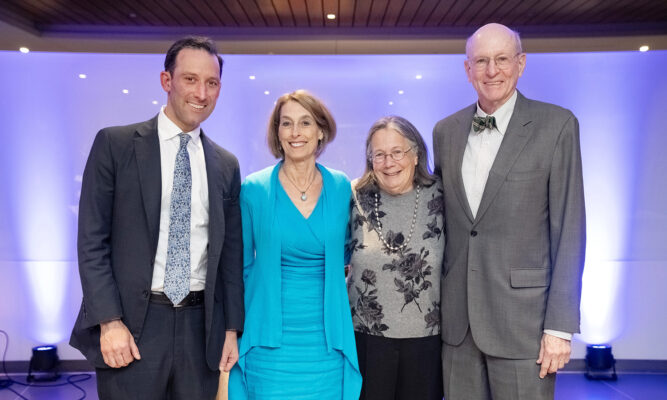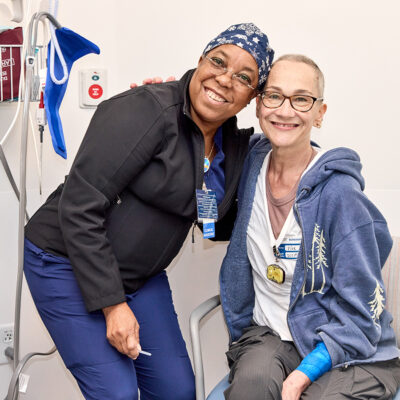Richard and Nancy Lubin Recognized with Dana-Farber's Highest Honor
We are delighted to share that the Sidney Farber Medical Research Award, Dana-Farber’s most prestigious accolade, has been presented to Dana-Farber Trustee Richard K. Lubin and Nancy Lubin in recognition of their remarkable service and unparalleled dedication to advancing our mission. For over three decades, their leadership and contributions have shaped cancer research and patient care, making an indelible impact on the Institute and the global medical community. Established in 1968 to honor the visionary work of Sidney Farber, MD, this award celebrates those whose efforts reflect his groundbreaking contributions to cancer medicine. Since its inception, the Sidney Farber Medical...
We are delighted to share that the Sidney Farber Medical Research Award, Dana-Farber’s most prestigious accolade, has been presented to Dana-Farber Trustee Richard K. Lubin and Nancy Lubin in recognition of their remarkable service and unparalleled dedication to advancing our mission. For over three decades, their leadership and contributions have shaped cancer research and patient care, making an indelible impact on the Institute and the global medical community.
Established in 1968 to honor the visionary work of Sidney Farber, MD, this award celebrates those whose efforts reflect his groundbreaking contributions to cancer medicine. Since its inception, the Sidney Farber Medical Research Award has been bestowed only 26 times, recognizing individuals and organizations whose passion and generosity have driven significant advancements in cancer research and care. The most recent recipients, the Hale Family, were honored in 2023, and we are excited to add Richard and Nancy to this distinguished group of extraordinary leaders and visionaries.
Together, Richard and Nancy’s contributions blend business acumen, community support, and a strong commitment to advancing innovative research, education, and mentorship. Their longstanding partnership with Dana-Farber is emblematic of their broader philanthropic ethos—investing in the people and institutions of Greater Boston and using their resources and influence to enhance the quality of life across the region. Richard has served as an Institute Trustee for more than 30 years, and in that time, he, Nancy, and the Richard K. Lubin Family Foundation have done so much for Dana-Farber, including bolstering drug discovery research; giving generously to support the Yawkey Center for Cancer Care; and empowering faculty through the establishment of the Richard and Nancy Lubin Family Chair at Dana-Farber and the Richard and Nancy Lubin Research Fund, both early investments in priorities of The Dana-Farber Campaign. Richard was an important partner in our historic campaign, serving as a member of the Campaign Cabinet.
In 2022, the Richard K. Lubin Family Foundation established the Lubin Family Foundation Scholar Award, which offers enhanced mentoring and financial assistance to promising early career physician-scientists, ensuring the continued advancement of cancer research. This special program is carried out under the direction of Nobel Laureate William G. Kaelin Jr., MD, and has already named three cohorts, totaling 12 current Lubin Scholars from Dana-Farber Cancer Institute, Massachusetts General Hospital, Brigham and Women’s Hospital, and MIT. Through their support, the Lubins have recognized that as cancer medicine evolves, we bear the responsibility to nurture the next generation of leaders in academic research, driving world-shaping science that will ultimately benefit patients everywhere. Earlier this fall, the Foundation made a second generous commitment to fund three additional cohorts of Lubin Scholars, extending and expanding its impact, while continuing the Lubin family’s commitment to supporting exceptional expertise, a core pillar of The Dana-Farber Campaign. The next call for applicants for the Lubin Family Foundation Scholar Award will be announced in December. More details, including eligibility criteria, can be found here.
As we reflect on the Lubin family’s extraordinary legacy, we are deeply grateful for their unwavering dedication and generosity. Thanks to their partnership, Dana-Farber continues to push the boundaries of what is possible in the study and treatment of cancer. Their contributions have been instrumental in driving Dana-Farber’s mission forward, inspiring hope for a future without the burden of this disease. It is an honor to recognize them with this prestigious award.












